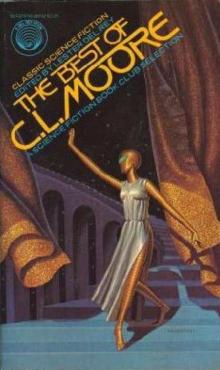Read The Best of C. L. Moore Storyline:
The Best of C. L. Mooreedited by Lester Del ReyC. L. Moore was one of the pioneers of women's science fiction writing. In these ten stories published from 1933 to 1946 in such magazines as Weird Tales, Famous Fantastic Mysteries,and Astounding Science Fiction, Moore displays her broad interest and particular style. She wrote simple stories around potentially profound ideas. Her characters in these stories (collected in this 1975 edition) are often very much the cinematic ideals, stunning soft women, tall blonde studly men, and I wouldn't want to use any of these for sexual role models. Even so, Moore is credited with creating strong willed female characters, for a genre (dare I say pulp?) that until then was dominated by men. Still, her women often fawn over the male characters, or they are agents of men's downfall. Her imagery is full of superlatives stumbling upon piles of superlatives. It is mythical, and sometimes overtly Freudian. These stories might not be much more than historical curiosities. A couple, though, particularly the last, are well done.Shambleau is a dark and vaguely erotic horror tale of Northwest Smith, a swashbuckling (early version of Han Solo?) character on Mars meeting up with a haunting and deadly vision from interplanetary mythology.Black Thirst takes Smith into the dark underworld of the planet Venus, on a mystical journey into beauty and evil. This story doesn't work as well as the earlier adventure, as Moore seems to be stumbling over herself to find words for greater and greater beauty and evil. The language of the story suffers from this eflorescence of adjectives.The Bright Illusion is Moore taking on the aphorism "beauty is only skin deep" by sending a man to a distant planet with bizarre residents, and having him face his illusions of beauty. The story's brevity, though, brings to mind another myth: "love at first sight". Too short for her to have really made her point.In Black God's Kiss, Moore descends again into a vivid and quite Freudian subterrenean hell. Her heroine is in search for a weapon of great strength and evil, but finds a revealing aspect of herself in the end. A queasy, somewhat numbing, tale.Tryst in Time is a pretty entertaining but basically absurd tale of a young perfect male specimen who, after living a full life of adventure, sets out to travel through time. Along the way, he meets a mysterious perfect female specimen. They enchant each other, and a strange and unexplained connection is made. It doesn't make much sense, but the story is amusingly told.In Greater than Gods, a genetic scientist in the 23rd century, about to make a breakthrough in gender selection, gets the frightening opportunity of seeing the various outcomes of a decision many generations into the future. The choice before him becomes far more weighty. His solution, though, is a bit of a cop-out, and the original decision is contrived. There is an old-fashioned (or sexist) tone to the tale as well, but with some hope for a balanced resolution.Fruit of Knowledge revives the mythology of Lilith, perhaps the first bride of Adam in Eden. It is more or less a straight retelling, in detail, of a myth suggesting that Adam went out of Eden still longing for his first flawed bride.No Woman Born is a longer story that takes the form of a long debate about the wavering humanity of a brain encased in metal. A beautiful stage performer is brought back to the limelight by a latter-day Frankenstein. The story is weighted down by all the talk, though.Daemon, again, is mythical, as a mentally challenged young man relates his abandonment on an Atlantic island, where he encounters the forest sprites exiled since the advent of Christianity. The tale is interesting, but its mythology somewhat simplistic.Vintage Season, the best and last in this collection, is a tale whose tone would be familiar, years later, to fans of The Twilight Zone, (for which Moore did write one episode) as it has that same ironic moral logic. Mysterious tourists from a far-off place visit an English city to experience an historic event. Do the locals know what they're in for? This story was adapted into a television movie in 1992.At the end of this collection, in an afterword titled "Footnote to Shambleau... and Others", Moore tells a little bit about her writing process. It ends up being much more random than one might expect.Pages of The Best of C. L. Moore :
